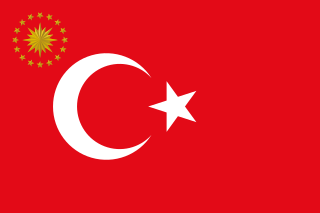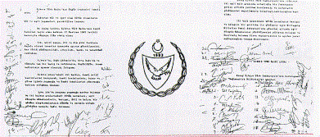Law enforcement in Northern Cyprus is administered by the Republic's Security Council and the Ministry of the Interior, to whom the Turkish Republic of Northern Cyprus's police force, the Directorate General for Police, reports. The commander of the police service of this de facto independent republic sits on the Republic's Security Council along with representatives from the Ministry of Interior, Foreign Affairs and Defence, the armed forces and the President.
The police force is regulated under Section 118 of the Constitution:
The establishment, duties, powers and responsibilities of the Police Organization shall be regulated by law. The police are charged with performing their duties within the framework of the Constitution and laws with due respect to the principles of a democratic State under the rule of law and to the fundamental rights of citizens. [1]
The emergency number for the police force in the Turkish Republic of Northern Cyprus is 155.

A coast guard or coastguard is a maritime security organization of a particular country. The term embraces wide range of responsibilities in different countries, from being a heavily armed military force with customs and security duties to being a volunteer organization tasked with search and rescue without law enforcement authority. In most countries, a typical coast guard's functions are distinct from those of the navy and the transit police, while in certain countries they have similarities to both.

The president of Turkey, officially the president of the Republic of Türkiye, is the head of state and head of government of Turkey. The president directs the executive branch of the national government and is the commander-in-chief of the Turkish military. The president also heads the National Security Council.

A commander-in-chief or supreme commander is the person who exercises supreme command and control over an armed force or a military branch. As a technical term, it refers to military competencies that reside in a country's executive leadership, a head of state, head of government, or other designated government official.

The declaration of Independence of the Turkish Republic of Northern Cyprus was a unilateral declaration of independence (UDI) from the Republic of Cyprus by the Turkish Cypriot parliament on 15 November 1983.

The United Nations Peacekeeping Force in Cyprus (UNFICYP) is a United Nations Peacekeeping Force that was established under United Nations Security Council Resolution 186 in 1964 to prevent a recurrence of fighting following intercommunal violence between the Greek Cypriots and Turkish Cypriots, to contribute to the maintenance and restoration of law and order and to facilitate a return to normal conditions. Major General Erdenebat Batsuuri (Mongolia) is the current Force Commander of UNFICYP, appointed in 2024, and preceded by Ingrid Gjerde (Norway).

The Turkish invasion of Cyprus began on 20 July 1974 and progressed in two phases over the following month. Taking place upon a background of intercommunal violence between Greek and Turkish Cypriots, and in response to a Greek junta-sponsored Cypriot coup d'état five days earlier, it led to the Turkish capture and occupation of the northern part of the island.

The Government of Turkey is the national government of Turkey. It is governed as a unitary state under a presidential representative democracy and a constitutional republic within a pluriform multi-party system. The term government can mean either the collective set of institutions or specifically the Cabinet.

The Security Forces Command is the military and security force of the unrecognized Turkish Republic of Northern Cyprus.

Law enforcement in Turkey is carried out by several departments and agencies, all acting under the Ministry of Internal Affairs except military police which is under the command of the Turkish Armed Forces and the National Intelligence Organization which directly reports to the president.

The London and Zürich Agreements for the constitution of Cyprus started with an agreement on 19 February 1959 in Lancaster House, London, between Turkey, Greece, the United Kingdom and Cypriot community leaders. On that basis, a constitution was drafted and agreed together with two prior Treaties of Alliance and Guarantee in Zürich on 11 February 1959.
Human rights in Cyprus are protected by the constitution of the Republic of Cyprus.

The Cyprus Police, is the national police service of the Republic of Cyprus, falling under the Ministry of Justice and Public Order since 1993.
Law enforcement in Azerbaijan comes under the control of the Ministry of Internal Affairs of Azerbaijan, which administers the National Police of the Republic of Azerbaijan. Admitted to the Organization for Security and Co-operation in Europe (OSCE) on 30 January 1992, with an OSCE office opening in Baku on 16 November 1999. It is a member of INTERPOL.

In many countries, particularly those with a federal system of government, there may be several law enforcement agencies, police or police-like organizations, each serving different levels of government and enforcing different subsets of the applicable law.
The Constitution of the Republic of Cyprus provides for freedom of religion. The government of the Republic of Cyprus is the only internationally recognized government on the island, and administers two-thirds of the island.

Northern Cyprus declared its independence in 1983 with its official name being the Turkish Republic of Northern Cyprus (TRNC). It is recognized by Turkey.

The Turkish Federated State of Cyprus (TFSC) was a state in Northern Cyprus, declared in 1975 and existed until 1983. This state was not recognised by the international community. It was succeeded by the Turkish Republic of Northern Cyprus.
Human rights in Northern Cyprus are protected by the constitution of Northern Cyprus. However, there have been reports of violations of the human rights of minorities, democratic freedom, freedom from discrimination, freedom from torture, freedom of movement, freedom of religion, freedom of speech, right to education, right to life, right to property, and the rights of displaced persons. The rights of Greek Cypriots displaced by the 1974 Turkish invasion of Cyprus, notably their rights to property and right of return, is one of the focal points of ongoing negotiations for the solution of the Cyprus question.

Law enforcement in Syria, in Syria, is carried out by the Public Security Police, which is a force for general policing duties; internal security duties are carried out by different intelligence agencies and has been subsequential replaced by a successor agency named the General Security Forces under the new Syrian transitional government. The Political Security Directorate is one of these agencies and is under the guidance of the Ministry of Interior of the Syrian government. The Directorate is used for covert intelligence gathering and internal security issues within Syria. Syria has been an INTERPOL member since 1953. Since the outbreak of the Syrian Civil War, much of Syria has been outside the control of the Syrian government. Currently, the Asayish are responsible for policing in the Autonomous Administration of North and East Syria, the Turkish-backed Free Syrian Police in areas under the Turkish occupation of northern Syria, and various Syrian opposition groups around Idlib














